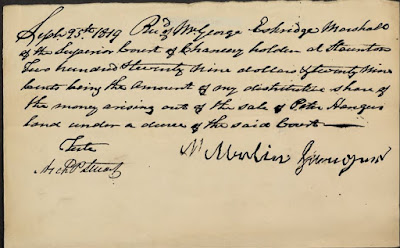After writing about 2nd Great Grandmother Mollie Brown in March of last year, I closed my post saying “P. S. Dear Family and Friends, I would love to see a photo of Mollie. Please share photos and stories!”
I got my wish early one September morning thanks to Kelly Zuber. Kelly shared this picture of Great Grandmother Mollie and Grandfather John Will White in her Zuber family tree online at Ancestry.com.
Great Grandma Mollie and Grandfather lived to celebrate their 60th wedding anniversary November 14, 1932.
Here’s a repeat of my March 2015 blog post.
The Brown’s Welcomed a July Baby, 1854, Augusta Co., VA
James Alexander Brown and Mary A. Zimmerman (aka Carpenter) welcomed a summer baby July 27, 1854. Mary Agnes Brown was born in Augusta County, Virginia at Lyndhurst (south of Waynesboro).
2nd Great Grandmother Mary Agnes, known as Mollie, grew up in the South River District in a home that had belonged to her Zimmerman Grandfather. During the Civil War Mollie’s father died Sept. 27, 1864, when she was just ten years old. I don’t believe her father served with the Union or Confederate Army. After the father had died, Mollie’s mother and two younger brothers remained on the Zimmerman place.
Mollie married John William White near Waynesboro, Virginia Nov. 14, 1872. By June 25, 1880, Mollie and John William were living in the Middle River District along with three children—Clara Louise, James William, and Arthur Stuart White. My Great Grandmother, Ella Virginia, was their fourth child born Oct. 10, 1881, followed by Olive Leora, Bernard Brown and Ernest Boyd White.
The White family was back in the South River District by 1900. Clara Louise had married Adolphus Marion Brown by this date. James William married Sally Wilkes Dec. 21, 1898 in Bedford County. Although Arthur Stuart hadn’t yet married, he wasn’t living with his parents. Only the younger children remained at home.
Ella Virginia married James Clyde Clemmer June 7, 1905. Jan. 2, 1908 Arthur Stuart married Nettie Florence Sheltman in Buena Vista City, Virginia. Bernard Brown married a lady named Grace Alexander in 1911. Olive Leora was the next child to wed marrying Walter W. Sandy January 8, 1914. Ernest Boyd didn’t marry until after his parents’ death. His first wife was Mable Mahler. When Mable passed, he married her sister, Margaret.
In their later years, John William and Mollie White made their home in Staunton. Mollie died Nov. 24, 1932. The Staunton News-Leader published her obituary Saturday morning, November 26, 1932.
Transcript of obituary:
Mrs. Mary Agnes White died early Thursday morning at her home on Straith street, after an illness of one day.
She was born July 27, 1854, near Lyndhurst, a daughter of James and Mary Carpenter Brown, and spent practically all of her life in Augusta county. Five years ago she moved to Staunton.
Mrs. White is survived by her husband, J. W. White; four sons, J. W., Jr., Princeton, W. Va.; A. S., Whitehorn, Va.; B. B. and E. D., Staunton; two daughters, Mrs. Clara L. Brown, Princeton, W. Va.; Mrs. Ella V. Clemmer, Middletown, N.Y.; a brother, I. S. Brown, Abilene Tex.; forty-one grandchildren, and twenty-four great grandchildren.
When a girl she joined Bethlehem Lutheran church, near Stuarts Draft.
The funeral will be held from the home of Hamrick & Co. at eleven o 'clock this morning, conducted by the Rev. Dr. C.M. Teufel, of Christ Lutheran church.
Burial will be in Bethlehem cemetery.
You might like these posts. Just click on the title below.






